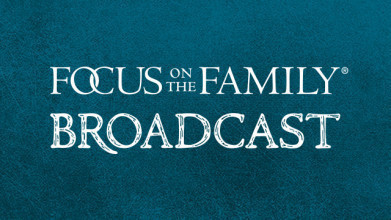Preview:
Shaunti Feldhahn: How do you rejoice in a difficult marriage? Here’s how you do it. You think on the best instead of the worst. It doesn’t mean you ignore the problems, but it does mean that you can completely change how you feel about your whole marriage.
End of Preview
John Fuller: Well, those insights come from our broadcast guest on the last Focus on the Family with Jim Daly. I’m John Fuller and Shaunti Feldhahn is back revealing some of the secrets she learned from very happy couples, and ways that you can apply some principles to your martial relationship and increase that happiness quotient. And Jim, imminently practical and very biblical conversation last time.
Jim Daly: Well, I hope so, John. And that’s what we’re trying to do each and every day here at Focus on the Family. Uh, Shaunti, it was so good to talk with you last time, but you kinda twisted my (laughs) mind a bit at the end.
John: (laughs)
Jim: Uh, one of the things we talked about… and if you didn’t hear last time, uh, go and get the download. Uh, get it on your smartphone, your iPhone. It’s worth it. I think it, the- there were so many good things that you shared, Shaunti, that people need to hear. And John, you’ll mention those details at the end of the program. But Shaunti, you talked about, it’s good to go to bed mad. Now, that seems upside down to me, and I think you’re probably gonna turn our world upside down (laughs) a little more today. But let me, uh, formally welcome you back to Focus on the Family.
Shaunti: It is always good to be with you guys.
Jim: Well, you have some great concepts, and we want to dive into it. And I want to start today, Shaunti, by reminding married couples that you’re in a spiritual battle. I- I think we often lose sight of how our flesh is at war with us. And not only that, the enemy, uh, wants to also destroy our Christian marriages, because it serves his purposes to discredit God’s sacrificial love for us. And to destroy our witness before the world. Uh, our marriage is the closest relationship we have on this earth, and it mirrors that self-sacrificing love that Christ has for us. Uh, and in fact, you mentioned earlier about Paul saying, “Whatever is true, whatever is right, whatever is noble, whatever is pure… Think on these good things to equip you to fight the spiritual battle for your marriage.” Right?
Shaunti: Yeah. Let me give you an example. A happy couple I was interviewing, I was asking them… and I do this with everybody. A- take me through your last conflict, the last time that somebody hurt your feelings and that there was a potential for it going downhill. And I was talking to this one guy who, he had, was getting ready for a really important business trip and had asked his wife many times, “Are you going to pick up my shirts at the dry cleaners? I’m leaving really early in the morning. I can do it.” “No, no, honey. No, I got it. I’ll get them.” “Okay, you sure? ‘Cause I can go by…” “No, no, sweetheart. I’ll go get them.”
So, he arrives home at 9:00 at night, the dry cleaners are closed, and the shirts aren’t there.
Jim: Hm. (laughs)
Shaunti: And he has to leave at 6:00 in the morning, and now he has n-… you know, “What am I gonna do?” This big business meeting.
Jim: Jean, I did not talk to her about this, okay?
John: (laughs)
Shaunti: (laughs) Really, this is not a real example. And so, I say, “Okay, what happens next?” ‘Cause this is where it can all go downhill. “I can’t believe you.” Blah, blah, blah, blah… and the enemy is going, “You’re right. She doesn’t care. She doesn’t appreciate…” And so I said, “Take me… what happens next?” “Well, I’m pounding the cabinet.”
Jim: (laughs)
Shaunti: “You know, putting the cabinets together that I’d been making and-”
“Okay, what are you thinking?” “I’m thinking, I asked her three times, and I was willing to do it. And- and she said she would, and… but you know, that’s not really fair, because… pound, pound, pound. Because you know, the baby was sick all day, and she’s been home with these cranky kids who’ve been sick. And she had to take the baby to the doctor, and then the li-, I know the line to get the prescription was, took a long time. And she had to go to the grocery store to get dinner, and… and you know, she always feeds the family, and she always cooks me dinner. And she’s such a great mom. And why am I being such a jerk?”
John: Hm.
Shaunti: You know? And what’s just happened there is that he has refused to allow the little voice of the enemy… “She doesn’t appreciate you. You- you, you work so hard, and she doesn’t care.” He’s refused to allow that. And instead, he’s talking himself out of being bad-
Jim: Hm.
Shaunti: … by focusing on what is good, not what’s bad. And what’s lovely instead of what’s maybe not so perfect right now. And what he can appreciate instead of what’s driving him crazy. Legitimately. And that is an example of the kind of things that we can learn from the happy couples, ’cause what they have found really is the secret sauce to a happy marriage.
Jim: Okay, now I’ve got to hit another trait that you identified, though. Because it seems, again, counterintuitive. Where you talk about this idea that keeping score is a good-
Shaunti: (laughs)
Jim: … thing to do.
Shaunti: I knew you were gonna bring that one up.
Jim: It’s totally opposite-
Shaunti: (laughs)
Jim: … but what did you find in that regard? Keeping score is good?
Shaunti: Yeah, we are always told not to keep score, not to keep score. And instead, these happy couples absolutely did keep score, believe it or not.
Jim: I mean, like in a gentle way? Or…
John: Yeah.
Shaunti: But they kept score totally differently.
Jim: Oh, okay.
Shaunti: They kept score of what the other person was giving. And so, it was really interesting watching the difference. Instead of, we’re, of course it’s terrible to keep score of what they’re not giving.
Jim: The wrongs.
Shaunti: And of course it’s gonna be awful to keep score of the wrongs. And, “What they’re getting, and what I’m not getting.” You know, I mean, that’s gonna always derail your marriage.
Jim: Describe what, what the healthy way of keeping score (laughs) looks like.
Shaunti: So, an example, all right? So, the same husband that I was just talking about. He was describing how, um, with his wife, she had gone through a season where their kids were actually sick for a whole week. And in and out of the doctors, and cranky kids, and she’s a stay-at-home mom. And so, he’s automatically… he’s going, “Wow, I’m really aware of the fact that she’s had this really hard week, and she’s been with these sick kids. And oh my goodness, she’s giving so much to them, and she’s gotta be so tired. So, you know, come Saturday, when I’m home from work, honey, why don’t you just give me the kids? I’ll take the cranky kids and the sick n-, you know, and wiping their noses and all that. And you go out with your girlfriends, and you just get out for the day.” Because he is so aware of what she’s been giving, that there’s this gratitude. And so, there’s this outpouring of, what can I do to give back? And it’s not like, “You know, I’m just gonna be such a wonderful husband. And I’m gonna allow her to go out, because I’m just that nice of a man.” And instead, it’s like, “No, I am seriously grateful, because I notice what she’s giving. And so, I want to give back.”
And then, that day, she goes out with her girlfriends, and she’s like, “Wow, that was so sweet of him. He’s such a nice guy. What can I do to give back to him?”
Jim: And all her girlfriends are saying that too.
Shaunti: And all her girlfriends-
Jim: (laughs)
Shaunti: … are saying that too. And, “What can I do to give back to him?” Because she’s grateful. And it becomes this positive cycle. This one right here is another one of the common ways that the couples who started out very unhappy ended up very happy in their marriage.
Jim: Hm. But are you really saying, um, keep score of how you can bless your spouse?
Shaunti: Actually, believe it or not, it’s not just that. It truly is, keep score of what the other person is giving, because that leads to gratitude. And then-
Jim: Okay.
Shaunti: … you want to bless. As opposed to drudging it up out of willpower.
Jim: Right.
Shaunti: Like, okay… gotta figure out what to do to bless my spouse. Because it really is out of a gratitude and a love.
John: I think it’s important probably to recognize, Shaunti, that this is a, a matter of time, here. This is not an instant fix. Jim, I remember one time, D- Dena went off on a women’s conference, um, for the weekend. And I was so happy about being the hero and managing the fort with so many kids, and we made it through the weekend. And I knew she was gonna walk in the door and just throw her arms around me and thank me. And she walked in the door and said, “I am sick. Goodnight.” (laughs)
Jim: (laughs)
Shaunti: (laughs)
John: So, wow, so there-
Jim: She was sick.
John: There I am standing with all this expectation, and, and I mean, if I would have stopped there in keeping score of a good thing… I mean, it- it could have stopped me dead in my tracks. Her response wasn’t what I wanted to see. So, there is an element of time here, right?
Shaunti: Oh, always. I mean, listen, we are married to imperfect people, right?
Jim: (laughs)
Shaunti: And- and you know what? We are imperfect people.
Jim: Oh, there you go. That’s the part I was been waiting for.
Shaunti: And they are married to, and they are married to us too. (laughs)
John: Well, I- I was very, I was very proud in my handling of that. So, I was sinful in that.
Jim: You’re proud of your imperfection.
John: Yeah.
Shaunti: Well, you know, we’re all, we’ve all been in those shoes. I think we can all come up with examples for that, and this is all part of that grace and that generosity. This is actually, to me, one of the reasons why… you know, Jim, you talked about, you needed to rely on God for this kind of awareness of what the other person is giving. And really, truly how to look at the positive instead of the negative. I mean, ’cause that doesn’t come naturally. One of the other things that I found in the research… there was a very high number of these highly happy couples that said, “I can’t do it on my own.” That, “I have to rely on God.”
I mean, I was… as a researcher, I was pretty careful to try to go beyond the bounds of the church. And interview people in coffee shops, and airports, and you know, I always feel bad for the person sitting next to me on the airplane for two hours. You know? (laughs)
Jim: (laughs)
Shaunti: It’s like…
Jim: You’re that person? Oh, no. (laughs)
Shaunti: (laughs) I get great data, though. But, but here’s what really stunned me. I was on purpose, trying to find people who might not believe in God.
Jim: Uh-huh.
Shaunti: But they kept bringing him up. It was funny. Like, I’d talk to them and say… you know, and they would, if they had shown that they were the highly happy couple. You know, I’d say, “Okay, so help me understand. What are some of the secrets? You know, why are you so happy?” And they would often look at each other, and then look at me and say, “It’s because of Jesus Christ.”
Jim: Huh.
Shaunti: And I could tell they were saying, “Oh, it’s a chance to witness to a social researcher.” (laughs)
Jim: (laughs) Right.
Shaunti: You know? And which was so encouraging to me.
Jim: L- let me ask you this, though. And that is encouraging. But to those who didn’t, um, point to a relationship-
Shaunti: Yeah.
Jim: … with Christ.
Shaunti: Which did happen, of course.
Jim: Did you happen the biblical principles still in play?
John: Ah. Mm-hmm.
Shaunti: Yes, very much so.
Jim: ‘Cause that’s what I would think would be true.
Shaunti: And that absolutely was… I mean, and every now and then, I’d jot down a note on my, you know, little notebook. And I’d say, “Huh, you know, it’s actually one…” ‘Cause they’d be talking about being kind, for example, speaking kindly to one another. And I’m like, “Yeah, like, you know, the Bible says, be kind to one another.” You know, I’d, I’d try to like, get it across. You’re already living by biblical principles, you’re not realizing it. (laughs)
Jim: No, and- and that to me, is encouraging. That should be self-evident, then.
John: Mm-hmm.
Jim: When you’re witnessing to somebody, to be able to bring these things up.
Shaunti: Well, here’s one of the things that was really… as I started looking into the numbers, we have this, um, this belief that really isn’t true in our culture. That most couples are just kinda hanging on, and that they’re really not enjoying their marriages, and tha-
Jim: Right, we have bought into that belief.
Shaunti: We’ve kind of bought into that belief.
Jim: Even Christians.
Shaunti: And it’s not true at all. And you know, all the studies that have been done have found that 80% of marriages, on averages… 80% of marriages are happy. And it’s not perfect, certainly. But enjoying being married, generally.
Jim: 80%?
Shaunti: 80%.
Jim: Folks, hear that? 80%.
John: Hm.
Shaunti: And the thing, one of the things that to me, is even more encouraging, is when I started studying what the numbers really are in the church. ‘Cause we’ve kind of bought into this idea that-
Jim: 50%.
Shaunti: … that, you know… 50, yeah, 50% divorce rate, and it’s the same in the church. And none of that is… and that is so not true. It’s based on some big misunderstandings of the Barna data. And that, in the church, instead, what percentage of these couples that say that they’re looking to God as the center of their marriage… what percentage aren’t just happy? What percent are very happy?
Jim: Hm.
Shaunti: Where both the husband and the wife are just loving this gift that God has given them? 53%-
Jim: Hm.
Shaunti: … of people that say that God is at the center of their marriage are not just happy, they’re very happy.
Jim: Hm.
Shaunti: And the overall number is like 90 something percent. But that is huge, ’cause out there in the regular culture, it’s probably 25-30% are very happy. The ones who say that God is the center of their marriage is double that.
Jim: That’s, I- I mean, that is amazing. And it should be so.
John: Hm.
Jim: And we need to get that word out, that, uh, it is happening, and that you can have that kind of happy marriage. And, uh, it’s rooted in a relationship with Christ. Wh- what about the couple where, um, you know, the husband… it’s what they both refer to as a vicious cycle. They’re both not thinking the best of each other-
Shaunti: Yeah.
Jim: … perhaps. And, um, the husband will say that, you know? “You always think the worst motivation for me.” And the wife says, “Well, you’ve given me plenty of ammunition.”
Shaunti: Ouch. (laughs)
Jim: Yeah, ouch. These are all ouches. And she’s thinking, “Well, you’ve wounded me so many times, I’m responding to you. I’m simply reflecting the way-”
Shaunti: Right.
Jim: … “you’re treating me.”
John: Hm.
Jim: And the husband’s saying, “Well, I’m reflecting the way you’re treating me.”
Shaunti: Total vicious cycle.
Jim: What happens there? What are you trying to do, and how does a- a couple pull themselves up out of that and get happier?
Shaunti: Yeah, well here’s one of the other interesting things that I found. And actually, probably for me personally, this was one of the most encouraging things that I saw in this entire project over the last three years. Is that many of the happy couples that I surveyed and interviewed had been there, had been at that unhappy place.
Jim: So, they went through that valley.
John: Hm.
Shaunti: They went through that valley.
Jim: Interesting.
Shaunti: And now, I’m surveying them, you know, some number of years later, and they describe themselves as being incredibly happy in their marriage. And, and I should explain, by the way, that the way I identified that is if the husband and the wife independently… without ever knowing what the other person said about their level of happiness. If they both chose that they were at the highest level of the scale of happiness. Those are the couples that I was talking to.
Jim: Hm.
Shaunti: So, this isn’t like, the husband’s saying, “Yeah, we’re great.” And the wife is like, “Eh…” You know, this is independently both agreeing. And so, many of those people had gone through the valley. What did they do differently? And one of the biggies is that one person decided to stop the cycle.
Jim: Hm.
Shaunti: Just one. It wasn’t necessary both. And that’s this wonderful paradox about serving the other person and just doing what you’re called to do, regardless of whether your spouse does their part. And that is, honestly, one of the things that allows that cycle to be broken. For example, maybe you speak to me in a really rough tone. I am not going to respond in kind. “La- la- la- la- la…” I’m not listening, right? I’m just-
Jim: You’re closing your heart.
Shaunti: Ye-, and I am going to, instead of responding the way I naturally want to… I’m going to force myself to take a deep breath, and I’m going to speak to you kindly regardless.
Jim: Hm.
Shaunti: And at some point, when you give that grace, it brings conviction. And instead, you know, like that other person starts to want to treat you kindly-
Jim: Hm.
Shaunti: … because you’re treating them so kindly. You know that scripture about, you know, “Treat them kindly. It heaps burning coals on their head.” You know? Because-
Jim: (laughs)
Shaunti: … because you start to feel terrible that you’re being such a grouch, right? That’s an example of one person making a choice can make a big difference.
Jim: And can break that cycle.
Shaunti: Can break the cycle.
Jim: Wh- what about the spouse that… and again, I think I know the answer to this, but I want to ask it. (laughs) What about that spouse who’s saying, “Hey, you know what? I’m looking for the good in my spouse, but I ain’t seeing much.”
John: Hm.
Jim: How do you keep yourself motivated in that regard? It’s really a godly thing to be able to do that. It’s not natural for us in our human weakness to make that decision. We need God to help us.
Shaunti: We do, because it’s very unnatural. But you know, honestly, there is always something that God has put in that person, to be the person that you need them to be. There’s always gonna be that there. I know, I’m sure that there are going to be a few exceptions. You are married to an ax murderer. Okay, I don’t know.
Jim: (laughs)
Shaunti: Maybe they’re beyond help. I don’t know. But in most cases, you truly are married to someone who cares about you. You need to look for the proof of that, not look for the proof of the opposite. And that’s the problem. It is so easy to get into that phase of, “Well, I’m looking, but I’m not seeing anything.” Well, then, you know what? I’m sorry, you’re not looking hard enough.
Jim: Let’s get back to your book, The Surprising Secrets of Highly Happy Marriages. Uh, in there, you talk… these are the little goodies that you found in your research.
Shaunti: (laughs)
Jim: I like to think of them that way. But you said happy couples boss their feelings around. Again, that’s a- a grabber, but-
Shaunti: (laughs)
Jim: … what does it really mean?
Shaunti: This is that thing where they talk themselves out of being mad. Right? Or- or when their, when their thoughts start to go in a negative direction, they’re like, “Nope. I’m not gonna go there. I’m gonna do that Philippians 4 thing instead, and I really want to focus on what is not lovely, but I’m going to focus on what is lovely. And I want to focus on… right now I’m really frustrated, and I want to focus on what is not worthy of praise. But I’m gonna focus on what (laughs) is worthy of praise.” It was actually really interesting. In, they got so used to that, or it became such a habit over time…
Jim: A routine.
Shaunti: Yeah.
Jim: Yeah.
Shaunti: That in the end, I think it was something like two thirds of these ha-, really happy couples… that had become so much a part of their life, that when I asked, you know, “What do you do with the negative train of thought?” Instead of saying, “Okay, well here’s how I combat it, and here’s how I do that…” Two thirds of them said, “You know, I’ve gotten so used to doing this, I stopped that negative train of thought before it even gets started.”
Jim: Before the whistle blows.
Shaunti: Yeah.
Jim: (laughs)
Shaunti: “About my spouse.” And so, that’s one of the reasons that they’re so enjoying ma- being married. Because they are constantly in a state of awareness of all the good things. Even when, yeah, we’re dealing with issues, like anybody else.
Jim: Shaunti, let me ask you this question. It’s a little tender.
Shaunti: Okay. (laughs)
Jim: But I think we need to ask it. Uh, for that person who feels they’re having to tell their spouse what they want or need… it kind of for them, takes all the romance out of it. And, uh, you know, they would prefer that the spouse knows what they want or need. Is that fair, or is that maybe unfair that they would have that expectation?
Shaunti: It’s unfortunately very unfair. Um, this is one of the things that, uh, I, as I identified these 12 things, I kept (laughs) coming up with this one and going, “Oh, man. I have a tendency to do this.”
Jim: I think we all do. I mean-
Shaunti: Well-
Jim: … to John’s ex- example, I mean, he was taking care of the kids all weekend, Dena came home… you had an expectation. She did not (laughs) meet that expectation.
Shaunti: (laughs)
Jim: And that’s all of our stories.
John: Mm-hmm.
Shaunti: We’ve all been there, right? And truly, you know, psychologists will tell you, this is something obviously Greg Smalley can tell you way better than I can. But you know, psychologists and counselors will tell you that the thing that makes someone unhappy is having an expectation that isn’t met. You know, you’re expecting something to happen a particular way, and it doesn’t, and that’s what makes you unhappy. And as I dug into (laughs) these, you know, what are these happy couples doing differently from everybody else? Is they stopped themselves from… I guess you’d put it, kind of longing for or expecting something that was really difficult for their spouse to deliver. I mean, uh, for example, a common thing that I think we women really long for… you know, if- if things are a conflict, and, and there’s a lot of emotions in the room, and we’re all upset, and we’re not feeling like he loves me… and you, as a woman, sometimes kind of want to test whether he really cares about you by sort of pulling away. “Well, fine. I’ll just go do something else then.” And you secretly want him to come after you.
Jim: (laughs)
Shaunti: And say, “No, I’m not letting you get away, ’cause I love you that much… you know, until we work this out.” Well, actually, that’s an expectation from the romance novels. (laughs)
Jim: Mm-hmm. (laughs)
Shaunti: That’s not real life, and real-life men need time and distance to process when there’s been a lot of emotions in the room. And so, when you say, you know, “Fine, I’ll just go do something else or a while.” He’s going, “Oh, good.” (laughs) You know, you-
Jim: I get, I get a break.
Shaunti: … “Because I need to be able to go and think what I’m, what am I feeling, and how can we talk about this? So, so we can engage well later.” And so, it’s really not realistic to expect a… most real-life men, to do what the romance heroes do. “No, I’m not gonna let you get away, because I love you that much.” And instead, if you let yourself think, “If he cared about me, he wouldn’t let me get away.” That’s an example-
Jim: Hm.
Shaunti: … of something that’s just gonna make you crazy and unhappy, because you are expecting and longing something, for something that is very difficult for him to deliver.
Jim: It, when you boil it down then, um, for that couple that’s surviving…
Shaunti: Yeah.
Jim: They’ve heard us talk about these couples, um, today and last time, that are in a happy state. They’re fulfilled, they’re enjoying each other. Both wives and husbands hearing this are longing for that. Um, maybe they don’t have it.
Shaunti: Yeah.
Jim: What can they do when they get home tonight? When work is done, and they’re sitting at the dinner table, or maybe after dinner, whatever. What can they do to say, “Okay, we’re gonna change this?”
Shaunti: One of the most big picture encouraging things is to sit down and say, “You know what? We’re not where we really want to be. We both want to have a great, happy marriage. And you know what? If 80% of these couples can be that happy, we can get there too.” And so, a couple can come home tonight and say, “You know what? Let’s just try a couple of these things. Just pick…” And this is my big (laughs) encouragement for them… don’t try to pick all of them at once, ’cause you’ll just like, get overwhelmed.
Jim: Just one or two.
Shaunti: Just one or two. That’s, to us, the key. Pick one. Or maybe pick one for you and one for your spouse to do. Pick one or two things that you’re gonna try for a few weeks, and see what happens.
Jim: Mm-hmm.
Shaunti: Choose to believe, for example, that the next time you’re hurt, that he didn’t mean that. And he didn’t mean it the way it came across. Choose to believe the best. Choose to look for the good instead of the bad and the things you can appreciate, rather than what drives you absolutely bananas. And refuse to focus on the negative for a few weeks. And wow, you might find your feelings changing. And then, you know what? It’ll be a whole lot easier for you suddenly to then work on the next thing, and the next thing… ’cause now you’re suddenly starting to enjoy each other again.
Jim: And then you develop patterns of good behavior, biblical behavior, that really will help your marriage thrive, not just survive.
Shaunti: Yeah.
Jim: You know, many couples feel alone, and they don’t realize, uh, that others are dealing with very similar issues.
John: Mm-hmm.
Jim: That’s why it’s so good to talk openly about the things that we’ve talked about today. Uh, even with the happy marriages, there are gonna be times, seasons, moments, where it doesn’t feel very happy. That’s life.
Shaunti: Yeah. And that’s okay.
Jim: And when you get… it’s okay. And we need to grab that. And then we as Christians need to encourage each other, uh, both in our relationships, our marital relationships, as well as brothers and sisters in the Lord… to keep striving to do better. To think well of your spouse. To think well of God’s intentions for your marriage. Rather than just buying the cultural line. And you have done that so beautifully-
John: Mm-hmm.
Jim: … um, today and last time. Can I turn to those that are struggling? If you need help, that’s exactly why we’re here. We want to put that arm around you. We have counselors able to talk with you and to help you think through these issues. Of course, uh, Shaunti’s book, we’ll make available to you-
John: Mm-hmm.
Jim: … for a donation of any amount. And we mean that, any amount. If you can’t afford it, guess what? Others have provided the resources to provide that book for you. And I want to say thank you to those folks, because we need to you. Uh, we need the folks to help underwrite this ministry. So, if you can help us to stand in the gap for these couples, we would really appreciate it. Together, we can get the work done that the Lord needs to get done.
John: Mm-hmm.
Jim: And Shaunti, you have really brought some great insight. I so appreciate your ability in gathering all this research. I’m glad you got out of banking.
John: (laughs)
Shaunti: (laughs)
Jim: Maybe I’m glad you went to Harvard. They’ve taught you a lot. But you know, talking about the, uh, Surprising Secrets of Highly Happy Marriages.
John: Hm.
Jim: It’s given us all hope. Thanks for doing that.
Shaunti: Absolutely. I’ve so valued my partnership with Focus over the years, and I have seen so many lives changed through this ministry. I’m so grateful for you guys.
John: We’re certainly thankful for all that we’ve been able to do with Shaunti Feldhahn, and certainly this conversation was terrific now, Jim, before we wrap up, there was something you wanted to say about how Focus on the Family is here helping couples.
Jim: Well, I love what Shaunti mentioned near the end. You are not alone, no matter what your struggle in marriage may be. One of the things I love about Focus on the Family is that we can come together and acknowledge that there are others who have gone through similar experiences. And not only do we acknowledge it, but we are here to help you through that experience. I mean, we have collected 45 years of data to help you, uh, really know where you’re at in your marriage, and things you can do to improve your marriage. We are striving to strengthen and save as many marriages that we can through everything that we do here at Focus. Let me mention a couple of stats that we’ve done recently in our survey work with you, our constituents. Over the past 12 months, more than 440,000 couples have built stronger marriages with the help of-
John: Hm.
Jim: … Focus on the Family resources. That- that’s incredible.
John: Tremendous, yeah.
Jim: Focus has also helped more than 140,000 marriages in crisis. And again, this is just in the last 12 months. And I’m so proud of what Focus can accomplish. Uh, obviously with the Lord, uh, being the wind and the sail, and making these opportunities happen. Lastly, uh, we inspired and equipped 390,000 married couples to help strengthen other marriages. Primarily through, just natural conversation, friendship, encouragement, and maybe, uh, recommending a resource from Focus. These are great numbers, and it encourages us to see that our work is making an impact, and obviously all of that through Christ. Uh, to our listeners and viewers, you too can make an impact. One way you can do that is by getting Shaunti Feldhahn’s book, The Surprising Secrets of Highly Happy Marriages: The Little Things That Make a Big Difference. Today, if you make a donation to Focus on the Family, a gift of any amount, we’ll send you this book as our way of saying thank you for partnering with us in ministry. So, get the book from Focus on the Family, and get a great resource too.
John: Donate as you can, either monthly pledge or a one-time gift. And, uh, connect with a counselor, as Jim mentioned earlier. Uh, we have all the details at our website, focusonthefamily.com/broadcast. Or call 800, the letter A, and the word FAMILY. 800-232-6459. When you’re online with us, take a look at our Focus on the Family marriage assessment, which is a quick, uh, 7-to-10-minute quiz to help you gauge where you’re excelling in your marriage and maybe see an improvement point or two. Now, Dena and I have taken that, and it’s been helpful in our marriage. And, uh, really is good to have that evaluation and those communication points as a husband and wife. So, again, look for that quiz online the focusonthefamily.com/broadcast. Next time on Focus on the Family, we’ll hear about navigating your role as a mom or dad in healthier ways.
Katharine Hill: In a moment of reflection afterwards, I thought, “Who was I trying to impress?” Probably the other moms. And I think so easily, parenting can become a, a bit of a competition.
John: On behalf of Jim Daly and the entire team, thanks for joining us today for Focus on the Family. I’m John Fuller, inviting you back as we once more help you and your family thrive in Christ.



















